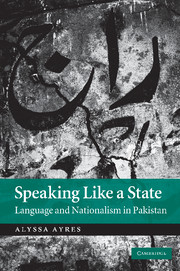Book contents
- Frontmatter
- Contents
- List of illustrations
- List of tables
- Acknowledgments
- Note on transliteration
- Introduction
- 1 Articulating a new nation
- 2 Urdu and the nation
- 3 The nation and its margins
- 4 The case of Punjab, part I: elite efforts
- 5 The case of Punjab, part II: popular culture
- 6 History and local absence
- 7 Bringing back the local past
- 8 Speaking like a state: language planning
- 9 Religion, nation, language
- 10 Conclusion
- Bibliography
- Index
2 - Urdu and the nation
Published online by Cambridge University Press: 25 August 2009
- Frontmatter
- Contents
- List of illustrations
- List of tables
- Acknowledgments
- Note on transliteration
- Introduction
- 1 Articulating a new nation
- 2 Urdu and the nation
- 3 The nation and its margins
- 4 The case of Punjab, part I: elite efforts
- 5 The case of Punjab, part II: popular culture
- 6 History and local absence
- 7 Bringing back the local past
- 8 Speaking like a state: language planning
- 9 Religion, nation, language
- 10 Conclusion
- Bibliography
- Index
Summary
In the demand for Pakistan, Urdu was most thoughtlessly declared to be the language of a “separate Muslim nation,” so now it is also paying the price for the creation of the “homeland.”
Qurratulain Hyder, “Chapter 66. Letter from Karachi,” River of FireThe late Qurratulain Hyder published her epic novel Āg kā daryā (“River of Fire”) in 1957, a decade after Partition. Considered a masterwork of Urdu fiction, the novel covers a time period from the fourth century BC through Partition's aftermath, with four interlinked characters spanning cycles of rebirth throughout millennia, and across the severed political fates of the two countries created in 1947.
At the time the novel appeared in Urdu, a number of significant language conflicts had already emerged in Pakistan, occasioning the narrator's observation that the language was “paying the price” for the emphasis on the national importance of Urdu for the creation and existence of the Muslim homeland. Indeed, the strange and troubled disjuncture between the idea of the Urdu language as emblematic of the nation and the reality in the then-new country is demonstrated by the ill-fated cases of Karachi's first film, Hamārī Zabān, and the creation of a new song genre for the nation. The film Hamārī Zabān (“Our Language”), an effort to eulogize Urdu and its national importance, was released in 1955 only to sink ignominiously, as film historian Mushtaq Gazdar noted, for its “admonitory sequences” were not audience pleasers.
- Type
- Chapter
- Information
- Speaking Like a StateLanguage and Nationalism in Pakistan, pp. 31 - 47Publisher: Cambridge University PressPrint publication year: 2009



